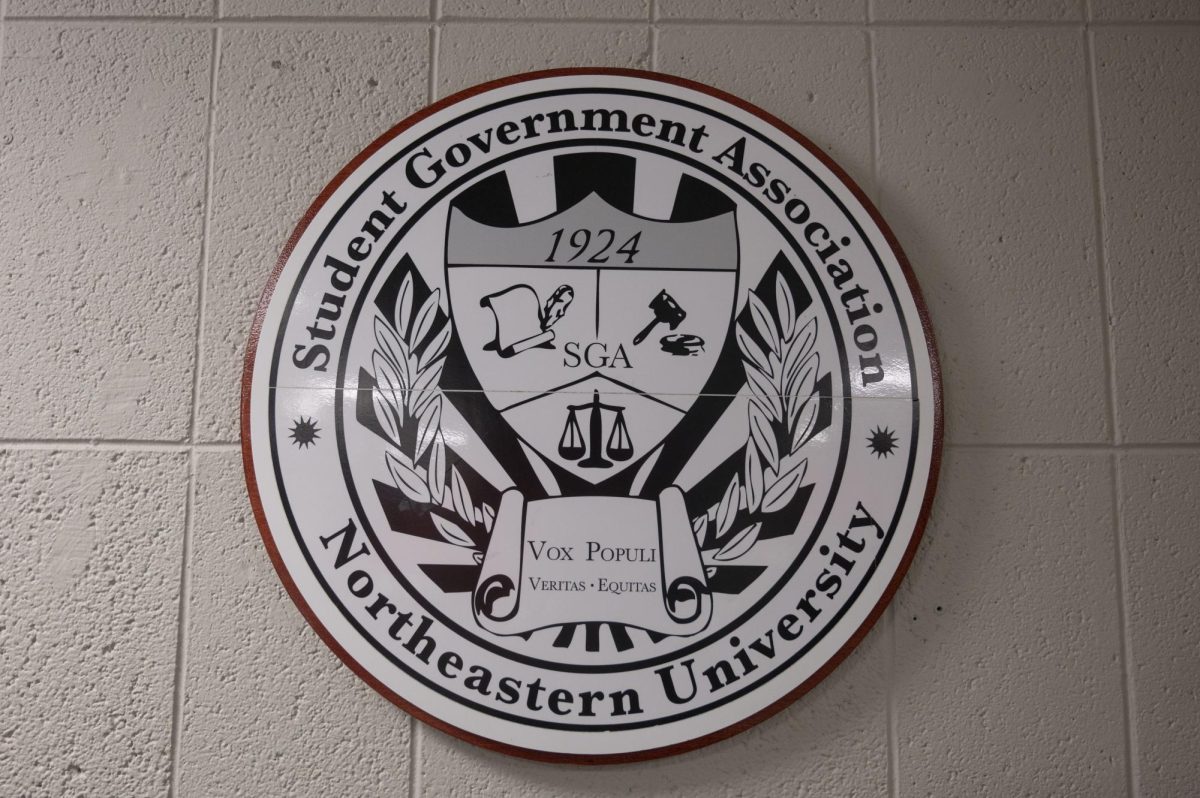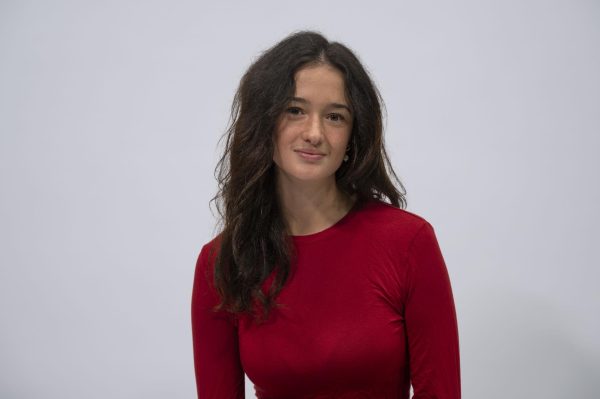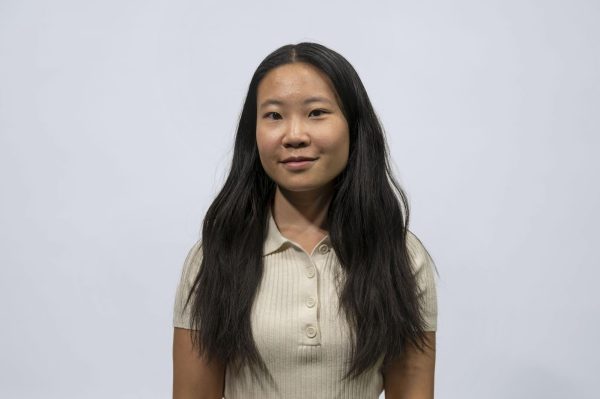When Student Body President Matthew Coughlin and Executive Vice President Cassidy Donoghue decided to join the Northeastern Student Government Association and later run for leadership roles in its executive office, they had two things in mind: a love for the university, but also a desire to make change.
“I think it was kind of a combination for me, at least, of really liking Northeastern and having a lot of pride in our school … but with the other side of that being that I think that Northeastern can do a lot better, especially for how much we’re paying to be here,” said Donoghue, a third-year political science major. “I think that there’s a lot the school can be doing to improve the student experience, and I just want to be a part of a student organization that is working to help fix that.”
In an interview with The News, Coughlin, a fourth-year mechanical engineering major, agreed with Donoghue and cited three angles that motivated him to run for president, including planning more engaging events for the student body, improving club funding and enhancing students’ lives.
“Cassidy and I really ran on … trying to improve the club funding and club recognition process,” Coughlin said. “The third core part that led us to run for these positions is really a desire to be able to improve that student experience by working with administrators, in particular, by connecting students with [the] university better and really advocating for what students want and what students need in the college experience.”
Coughlin and Donoghue ran as an uncontested slate for the 2024-25 academic year. At the time, Coughlin was the current executive vice president, or EVP, and Donoghue was the speaker of the senate.
Northeastern’s Student Government Association, or SGA, was established in 1921, known then as the Student Council; it was formed “as a vehicle for student participation in University affairs,” according to the Northeastern University Library Student Government Association records. SGA was originally comprised of representatives from the third- and fourth-year classes alongside members of the formerly recognized Student Activities Committee.
In the 1960s, encouraged by requests from the student body, the Council increased its involvement in student movements and mediations between university administration and the student body. The Council dissolved in 1973 due to internal conflict, later reorganizing under a new constitution as the Student Federation. Collaboration between the Federation and Northeastern administration led to its rebrand as the Student Government Association in 1981.
According to its website, SGA works to “take on different projects and initiatives, write legislation and advocate to members of the University administration to improve student life, classroom programs and the overall Northeastern Boston campus undergraduate experience.”
The current slate and leadership emphasizes a desire to promote quality of these projects over quantity, Coughlin and Donoghue said.
“After 100 years, we’re starting to analyze what works, what are things that we can reliably do in one school year, or have at least a timeline for, that can really make a difference for students,” said Olivia Oestreicher, a fourth-year political science and communication studies combined major and the SGA vice president for external affairs.
Oestreicher listed the SGA’s accomplishments for the fall 2024 semester as developing the Paw Print Pursuit, a voter registration drive with Northeastern Votes, in collaboration with the Resident Student Association. The organization also hosted an elections debate in collaboration with the College Democrats and Republicans and its first homecoming tailgate — a collaboration with NU Votes and the DogHouse, the official student section of the Northeastern Huskies.
Coughlin emphasized SGA’s involvement on the academic front when asked about tangible initiatives. Plans include updates to TRACE evaluation questions, the development of a syllabi database and the official establishment of the Wellness Days Pilot Program.
However, SGA has long been criticized for a lack of transparency in their operations. Students are often left wondering what exactly SGA does.
“The number one question I get when I tell Northeastern students I was student body president is: What does SGA actually do? Totally fair question,” wrote former student body president Angelica Jorio in an op-ed for The News in April. “SGA doesn’t exactly do a good job in letting students know what it does, especially since the majority of advocacy done in the organization doesn’t happen in Senate, as most believe, but in its committees instead.”
Moving forward, SGA leadership said it hopes to increase transparency in its actions and purpose.
“We are a student-based organization, and my job and my number one priority is to make sure that students know what we do and know that we are here for them,” Oestreicher said. “We’ve historically been failing at communicating what we do well enough to the student body.”
Recent initiatives to improve communication to the student body include a monthly newsletter, a redesign of the SGA website and active social media posting, according to Oestreicher.
While short-term initiatives and events allow for student involvement, in an effort to increase transparency with students, Oestreicher and Coughlin said that long-term goals and plans require collaboration with Northeastern administration.
“We’re working with the university’s pace too, and it’s slow and sometimes frustrating, but also very necessary in order to make these programs the quality that they need to be,” Oestreicher said. “We can’t do it without administrative connections.”
Recently, SGA added a spreadsheet link on its Project Memos section of its website that allows students to track the progress of SGA initiatives.
In recent years, SGA undertook the initiative to restructure its internal government. Efforts included the introduction of new positions and committees, as well as a redirection of responsibilities among SGA personnel.
“About two years ago, we looked across the SGA leadership team and saw a challenge, and that was that our leadership structure had not been updated in about 20 years. In that 20 years, though, Northeastern had changed a lot,” Coughlin said. “SGA had a structure that was reflecting a Northeastern of the past, not a Northeastern of the present.”
Coughlin said the need to restructure came out of rapid developments of the university, which includes the addition of global campuses, student body population growth, the university shifting focus to research, the development of research buildings and an increase in hiring of faculty and staff.
Oestreicher recalled her experience as one of the first 14 Northeastern students to study at the previous Mills College, now the Oakland campus, in the spring of 2022 as a motivator for structuring change in SGA.
“When I was there, I was also going to six SGA committees remotely on my computer and basically begging people in Boston to care about [campus expansion], because I knew that there were going to be more global campuses,” she said. “I knew that this was going to be a problem for students, and this was an area of SGA that zero people were working on.”
After Northeastern opened its Oakland campus in 2022, SGA created the Global Experience Committee, which “focuses on advocating for student voices within the university’s global network and works to address and improve the overall student experience across Northeastern’s undergraduate global programs.”
As the academic year progresses into its second semester, and the last semester of Coughlin and Donoghue’s term approaches, both SGA leaders hope to move forward and build a stronger organization.
“I’d like to look back, and I think we want to say that we accomplished kind of tangible, individual initiatives,” Coughlin said. “On top of that, though, I think we want to look back and say that SGA has continued to build this really durable framework to set projects up for success, both now and in the future, so that this association can continue to be a strong advocate for an improved student experience.”
Donoghue hopes students will recognize SGA as an organization they belong to and can rely on.
“I want to make sure that I’ve set SGA up in a way that students can get involved and feel like they belong in SGA, because we are supposed to be the voice of all students, not just some students,” Donoghue said. “We want to have that reach, have all of those opinions, have all of that passion brought to our association, because that’s really what drives the actual work.”
The Huntington News is dedicated to serving the Northeastern University community with original, professional reporting and creating an environment in which student journalists can learn from one another. Support an independent, free press at Northeastern University with your donation today.












